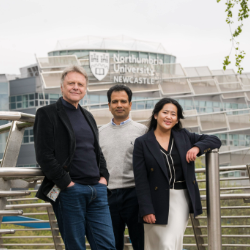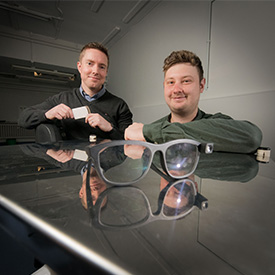-
Study
Study
Interested in studying at Northumbria? With 31,500 students, Northumbria is one of the largest universities in the country, offering courses on either a full-time, part-time or distance learning basis.
Discover more-
Undergraduate
- Undergraduate Study Degree
- Undergraduate Open Day & Events
- Application Guides
- Northumbria University UCAS Exhibitions
- Foundation Years
- Undergraduate Fees & Funding
- School & College Outreach
- Continuing Professional Development
-
Postgraduate
- Postgraduate Study Degree
- Postgraduate Research Degrees
- Postgraduate Open Days and Events
- Postgraduate Fees & Funding
- Flexible Learning
- Thinking about a Masters?
- Continuing Professional Development
- Change Direction
-
Student Life
- The Hub - Student Blog
- Accommodation
- Life in Newcastle
- Support for Students
- Careers
- Information for Parents
- Students' Union
- Northumbria Sport
-
-
International
International
Northumbria’s global footprint touches every continent across the world, through our global partnerships across 17 institutions in 10 countries, to our 277,000 strong alumni community and 150 recruitment partners – we prepare our students for the challenges of tomorrow. Discover more about how to join Northumbria’s global family or our partnerships.
Discover more-
Applying to Northumbria
- European Union
- Our London Campus
- Northumbria Pathway
- International Events
- Entry Requirements
- Agent Network
-
Northumbria Language Centre
- Faculty Requirements
- Acceptable English Requirements
- Pre-Sessional English and Study Skills
- Academic Language Skills Programmes (ALS)
-
International Fees, Funding & Scholarships
- International Undergraduate Fees
- International Undergraduate Funding
- International Masters Fees
- International Masters Funding
- International Postgraduate Research Fees
- International Postgraduate Research Funding
- International Money Matters
-
Life at Northumbria
- International student support
- The Hub - Student Blog
- Careers
-
International Mobility
- Current Northumbria Students
- Incoming Exchange Students
-
-
Business
Business
The world is changing faster than ever before. The future is there to be won by organisations who find ways to turn today's possibilities into tomorrows competitive edge. In a connected world, collaboration can be the key to success.
Discover more -
Research
Research
Northumbria is a research-rich, business-focused, professional university with a global reputation for academic quality. We conduct ground-breaking research that is responsive to the science & technology, health & well being, economic and social and arts & cultural needs for the communities
Discover more -
About Us
-
About Northumbria
- Our Strategy
- Our Staff
- Our Partners
- Student Profiles
- Alumni Profiles
- Leadership & Governance
- Academic Departments
- University Services
- History of Northumbria
- Contact us
- Online Shop
-
-
Alumni
Alumni
Northumbria University is renowned for the calibre of its business-ready graduates. Our alumni network has over 236,000 graduates based in 178 countries worldwide in a range of sectors, our alumni are making a real impact on the world.
Discover more - Work For Us
What will I learn on this module?
The module delivers four main themes of theoretical and technical content related to solar cell devices and modules within the field of Solar photovoltaics.
You will consider themes that include an introduction to the characteristics of the Sun that are relevant to solar cell operation. The solar spectrum and its intensity and total energy available from the sun, will be presented. Relevant semiconductor physics together with important semiconductor materials used in solar cells will be introduced. Underpinning quantum theory, required to understand energy bandgap, direct and indirect transitions and the electrical and optical behaviour of these materials, will also be reviewed.
Important processes used for the production of semiconductor materials and solar cells will be introduced together with ideal solar cell devices based on the p-n junction. Processes used to produce crystalline silicon as well as the other semiconductor materials and device component layers as well as techniques for controlling the electrical and device behaviour, will be presented.
Ideal behaviour of the junction will be considered under equilibrium conditions and the electrical behaviour derived. This will be extended to consider the behaviour when operating as a solar cell under illumination to include key performance parameters such as the open circuit current, short circuit current and cell conversion efficiency.
The module will proceed to introduce factors that affect solar cell behaviour under non-ideal conditions. The influence of temperature and the quality of electrical contacts on device performance will be examined. Finally, an overview of device characterisation techniques, module design and applications of photovoltaic devices will be presented.
How will I learn on this module?
Delivery of this module will be though a combination of lectures, laboratory work and independent learning. Classes will be instructed to read ahead in the notes and to use the reading lists for background reading. Lectures may also provide a formative approach to assessment with integrated exercises and problems to solve. Dissemination of information though lectures will be integrated with, and re-enforced by, laboratory experiments and modelling of devices with software such as SCAPS.
The laboratory work will enable a practical and collaborative experience of selected theoretical concepts related to semiconductor and solar cell behaviour. The practical experience will be further reinforced by the selection of one laboratory exercise for assessment in an extended report. The extended report will enable a deeper understanding of the relevant theory, practice and the development of the characterisation technique through independent and focussed study and will also providing opportunity to contextualise their results by comparison with accepted values from literature.
How will I be supported academically on this module?
The standard academic support for the module will be via the module tutor and research staff during the lectures reinforced by exercises and laboratory work and deepened by individual selection of one laboratory experiment for the extended report. Laboratory tutors will provide support through verbal feedback and comments during the laboratory exercises. When appropriate, comments may be generic, related to procedures, directed and discussed with all students or directed towards individual learning. A key benefit of laboratory work results from the evaluation of results and linking these to the theoretical understanding provided by the module lectures.
However extensive use of the university eLP platform will be employed to disseminate information and provide additional links to library, professional, web resources to help support the lecture and practical applications. Academic staff will provide formative feedback during the laboratory sessions and seminars to support your development within the topic. During this your studies you will be expected to contribute to your own personal development. This may be by direct staff interaction and independent learning using the electronic material provided via the eLP and revisiting experiments to deepen understanding in the laboratory, outside of formal scheduled times.
What will I be expected to read on this module?
All modules at Northumbria include a range of reading materials that students are expected to engage with. The reading list for this module can be found at: http://readinglists.northumbria.ac.uk
(Reading List service online guide for academic staff this containing contact details for the Reading List team – http://library.northumbria.ac.uk/readinglists)
What will I be expected to achieve?
1. Critical understanding and analysis of the physical principles relating to the operation and design of photovoltaic (PV) cells and developing this to PV modules.
(AHEP4 M2, M3, M4)
2. Critical understanding of the effect of material purity and crystallinity on the device performance
(AHEP4 M1, M3, M4)
3. Critically compare the design and operation of the main types of photovoltaic cells evaluate different fabrication methods in terms of device properties and manufacturing issues
(AHEP4 M3, M4,)
4. Demonstrate knowledge to compare and evaluate methods for the fabrication of photovoltaic modules, including performance and manufacturing issues satisfying engineering specifications within the context of current and future commercial and sustainability requirement
(AHEP4 M3, M4)
How will I be assessed?
There are two forms of summative assessment:
Assessed will include an extended Laboratory report (40%) and an end of year final exam (60%).
1. Laboratory experiments must be completed to pass the module and an extended report on one of the laboratory experiments must be submitted. Marks awarded will be based on the extended report that combines experiment theory literature and modelling of device materials and performance related to the laboratory measured phenomena. The extended laboratory report will focus on testing Los 1- 3. Assignment (40%) Feedback will be provided either in written form or electronically via the eLP.
2. The end of year exam will cover all the theoretical material and aspects of learning, this will cover LOs 1-4. End of year final exam (60%) .Feedback will be either in written form or electronically via the eLP.
Pre-requisite(s)
N/A
Co-requisite(s)
N/A
Module abstract
The module Advanced embedded Photovoltaic Cell and Module Technology is designed to teach you the basic principles and processes that underpin the behaviour, design and operation of Photovoltaic solar cells and modules.
The module is based on providing an overview of key semiconductor principles and materials together with characteristics of solar radiation and how devices are combined into photovoltaic modules.
This module will help you to develop the foundation photovoltaic device understanding needed within industry (great demand) and for developing research in related ideas.
Course info
UCAS Code H605
Credits 20
Level of Study Undergraduate
Mode of Study 4 years full-time or 5 years with a placement (sandwich)/study abroad
Department Mathematics, Physics and Electrical Engineering
Location City Campus, Northumbria University
City Newcastle
Start September 2024 or September 2025
All information is accurate at the time of sharing.
Full time Courses are primarily delivered via on-campus face to face learning but could include elements of online learning. Most courses run as planned and as promoted on our website and via our marketing materials, but if there are any substantial changes (as determined by the Competition and Markets Authority) to a course or there is the potential that course may be withdrawn, we will notify all affected applicants as soon as possible with advice and guidance regarding their options. It is also important to be aware that optional modules listed on course pages may be subject to change depending on uptake numbers each year.
Contact time is subject to increase or decrease in line with possible restrictions imposed by the government or the University in the interest of maintaining the health and safety and wellbeing of students, staff, and visitors if this is deemed necessary in future.
Your Learning Experience
Find out about our distinctive approach at
www.northumbria.ac.uk/exp
Admissions Terms and Conditions
northumbria.ac.uk/terms
Fees and Funding
northumbria.ac.uk/fees
Admissions Policy
northumbria.ac.uk/adpolicy
Admissions Complaints Policy
northumbria.ac.uk/complaints














